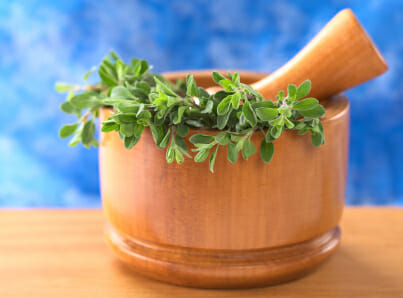The Herb
Marjoram, a member of the mint family, is an attractive, delicate-looking bush with soft, oval, dusty green leaves and small white flowers. It grows in knots or braids during the spring and can be used as hedge rows and borders of one’s gardens. Marjoram is considered among the most fragrant of herbs, as gently brushing the plant fills the air with its lovely smell. While the flowers make a beautiful garnish, the mid-spring leaves have a pleasantly sharp taste with a hint of camphor, which will mellow and sweeten with time.
Its History
Native to the Mediterranean region, marjoram grows profusely in Sicily. One of the cities – Marjoram – was named for this fragrant herb. Many Sicilians held the belief that this herb had the power to banish sorrow. The name marjoram is a Greek word that means “joy of the mountain,” and many ancient Greeks believed that if marjoram grew on a grave, that person would enjoy eternal happiness. Even today Marjoram is sometimes placed in hope chests or under a woman’s pillows to ensure a happy marriage. In the Middle Ages, this herb found considerable use in preserving and disinfecting meat that was less than fresh.
Health Benefits
Marjoram, traditionally considered a common kitchen herb, has also been beneficially used for many health issues:
- As an antidote to snake bites
- Bruises
- Conjunctivitis (pink eye)
- Coughs
- Headache
- Insomnia
- Lack of menstruation
- Menstrual cramps
- Motion sickness
- Joint and muscle pain
- Nausea
- Toothaches
- Colic (sharp intestinal pains in infants)
Dosing Information
Marjoram comes as dried and powdered leaves and a tea. Below are the common dosages:
- As a tea, steep 1-2 teaspoons of dried leaves and flower tops in a cup of boiling water for 10 minutes. Drink no more than 3 cups daily.
- As a tincture, ½ to 1 teaspoon taken orally three times daily.
- In aromatherapy it may be beneficial in treating asthma and headaches.
- The oil may be useful as a soothing massage oil for relieving muscle aches, sprains and strains.
Extracts of marjoram help to ease spasms (thus the reason it works well in treating nausea, vomiting, menstrual cramps and intestinal pain). It has been safely used as an additive to food, so eating it in moderation or drinking its tea may not cause harm and may relieve nausea, vomiting, cramps, and intestinal pain.
Certain components of marjoram (thymol and carvacrol) have been used to fight bacteria, viruses, and fungi in test tubes. Because the concentrations of these substances vary, it makes them unreliable for treating infections. When used to relieve toothache, marjoram’s effectiveness may come from thymol’s ablilty to fight oral infections. Still, medical experts recommend that you use conventional medicines to treat such infections.
Interactions
Mixing herbs with some medications may alter their effectiveness and / or produce unwanted side effects. Please speak to your health care provider before using any herbal compounds and tell them of all current prescription and non-prescription medications you are taking.
Important things to remember
- Don’t use marjoram in quantities larger than those commonly used in cooking if you are pregnant. Overdoses may cause uterine contractions.
- It is not clear if marjoram is safe for infants and children – there is no research in this area.
- The active components of marjoram vary among plants and products. Levels of the volatile oil content may decrease with age.
- Decrease your dose or discontinue use of marjoram if you experience nausea, vomiting, or diarrhea. Talk to your health care provider if these symptoms persist more that 2-3 days.
- Medical experts caution against consuming marjoram in quantities larger than those commonly used in cooking.
- You should know that the essential oils called ‘Oil of Marjoram’ and ‘Wild Marjoram Oil’ are made from thyme, not marjoram.
Disclaimer
There is little evidence to support marjoram’s therapeutic claims. Therefore medical experts caution people to limit their use of marjoram to oral intake or use as a topical healing agent in small areas, but never to open wounds, rashes, or the eyes.
Although there are no known incidents that anyone has been harmed by consuming marjoram, labels on some preparations of marjoram’s essential oil warn against its internal use. Marjoram contains thymol and hydroquinone, and may be poisonous. Call your health care provider if you experience any unusual symptoms while using marjoram.
This article is not intended as medical advice. You should always consult a health care provider before beginning the use of any medicines or supplements.
 Off The Grid News Better Ideas For Off The Grid Living
Off The Grid News Better Ideas For Off The Grid Living




